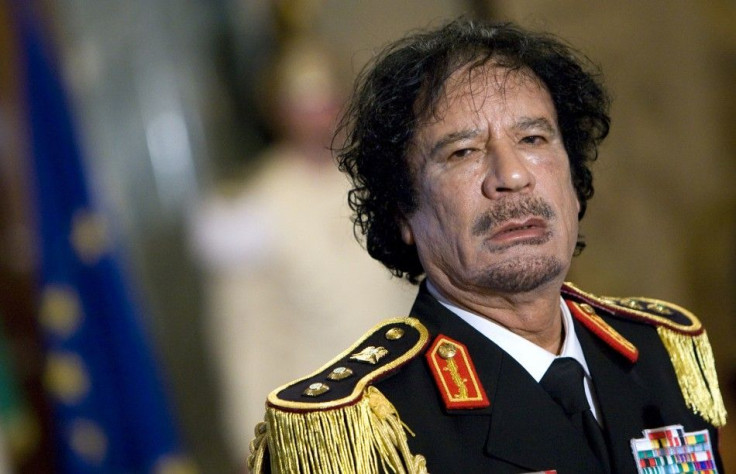Gadhafi Dead: How an Unlikely American Became a Gadhafi Insider and Predicted His Downfall

News rocked the world Oct. 20 that Moammar Gadhafi, the former autocratic leader of Libya, had finally been killed by rebel forces after months of conflict.
The grisly photos of his dead body show that the fallen ruler was not spared any pain.
Most were shocked; Jacqueline Frazier was not.
I'm absolutely not surprised. There's only two ways for them to end up, and that's dead or in jail, she said in an interview with This Week anchor Christiane Amanpour.
At first glance, Frazier would not appear to represent the archetypal Gadhafi insider. But, for seven months, the blonde, Vermont-born woman held an intimate position in the family's inner circle.
Frazier's connection to Libya's leader developed when she was first introduced to Gadhafi's son Saadi through a mutual friend. The notorious playboy had decided to return to Libya after he was kicked off his European professional soccer team after failing a drug test in 2003. He wanted to venture back to Libya to develop businesses in his father's country. He needed American affiliates to help cultivate this.
Frazier was one of the individuals who worked for him. I was hired to be a liaison between incoming American companies for a project he was working on, she said in the ABC News article.
The pretty blonde said that Libya was surreal, but that the people were very warm and friendly to foreigners. Everywhere you go they're welcoming in Libya. They love anyone who is coming in. It shows, I think, a sign of prosperity that their country is coming up...maybe a blonde American woman represents the future to them, she said.
As a woman, one would think Frazier faced prejudicial treatment. On the contrary, she says she saw the best parts of Libya. This is a stark contrast to the lives of most female Libyans, who faced oppression and fear in the tyrannical state. Citizens of Libya had to live amidst mass murders, rape, censorship and subjugation.
In February 2011, the people had finally suffered enough.
Frazier was in Libya when the Arab Spring spread to the country. She knew that something momentous was going to happen and that everything could radically change in an instant.
We knew that the social networks had decided that there was going to be a February 17th day of revolution, she said. We were kind of waiting in anticipation of that, and I was waiting with bated breath to see what happened next.
What was just a proposed digital movement quickly became very real. It wasn't scary until the day after it happened, after the revolution, where we knew things were really starting to move. And yes, that was scary.
When the uprisings started, it was Frazier's responsibility to protect American corporate assets in the area. She had to find out exactly what the planned agenda was in case turmoil increased.
My job was to find out, and to help these investments, she said. These people were having significant investments in Libya, and they wanted to know what the Libyan government was doing to protect those interests, ultimately, with two countries on both sides falling. So I asked the question many times, 'what is your plan? What is happening?' and I found nothing.
Frazier tried to alert the family that the country's citizens were all quickly turning against them. Gadhafi, who ruled for 41 years, refused to heed these warnings.
Moammar Gadhafi was always known for his arrogance. When ABC's Christiane Amanpour interviewed Gadhafi himself in February 2011, she asked the dictator if he would ever consider stepping down from his perch.
No, he said. They love me. All my people with me, they love me. They will die to protect me.
So, when Frazier attempted to salvage the situation and make Gadhafi change course, he refused to listen.
I think he thinks he's a deity, she said. I think he's very cunning, I think he's very smart, and I think he's very charismatic and very dangerous...it was also clear to me how out of touch with reality he was.
As a principal in the family's inner circle, Frazier noticed the subtle innuendos and inner workings of the clan.
I knew there was a lot of competition, she said. You can't imagine when you add the kind of financial background that the Gadhafis have, that it wouldn't just be outrageous, which it is. There's a lot of sibling rivalry.
There were times when he would favor one son, and that son would feel very confident, she said. Then the father would change favor and favor another son, and that created issues within the family. It created fissures within their family.
Gadhafi, who was known throughout the world as a bizarre eccentric who feared elevators and traveled in a bullet proof tent, created palpable tension within the family. The dynamics were quite strange and constantly shifting, observed Frazier. This rivalry actually proved to make situations worse once the uprisings began.
His seven sons, who have rather infamous reputations, were all competing for the throne. Jealousies flared even greater when a secret proposal leaked to put son Seif al-Islam in charge to create a constitutional democracy. These familial conflicts only proved to further deteriorate the possibility for a peace plan.
Ultimately, the Gadhafi's tactics were futile.
I told them not only that they weren't liked, but that ultimately, they would win by playing this in a Western way, Frazier said in the ABC News interview. Which is not to shut down and become closed off and to not allow journalists to interview people who have voices of dissension, because they were -- in their culture, in their mind, any voice of dissension is bad. They felt that they had to quiet everyone.
Now Moammar Gadhafi himself is the one who has been silenced forever.
You can watch the full interview from ABC here.
© Copyright IBTimes 2025. All rights reserved.




















